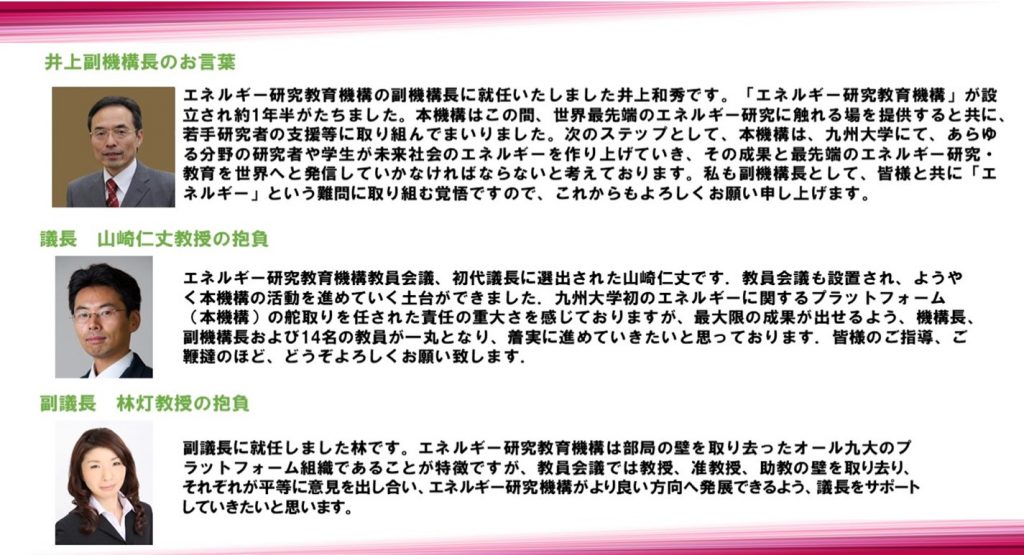九州大学エネルギー研究教育機構(Q-PIT)の林灯教授の研究成果が、平成30年度グリーンアジア国際戦略総合特区事業に採択されました
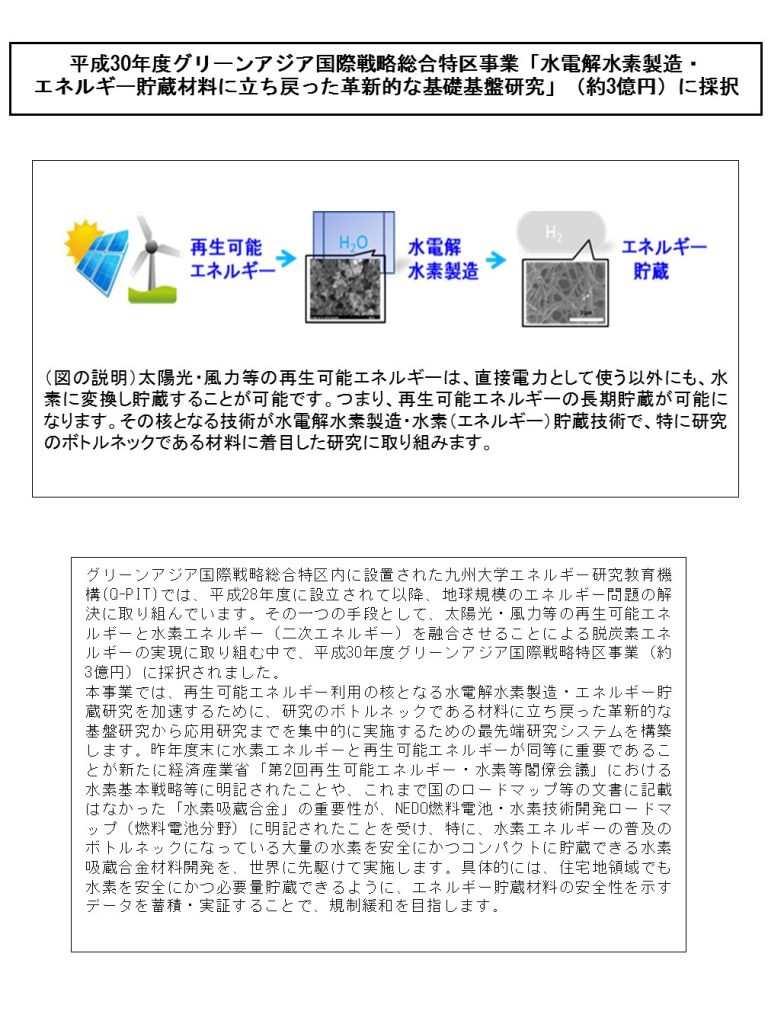
【お知らせ】運営体制図を更新しました
平成30年7月1日現在の運営体制図を更新致しました。
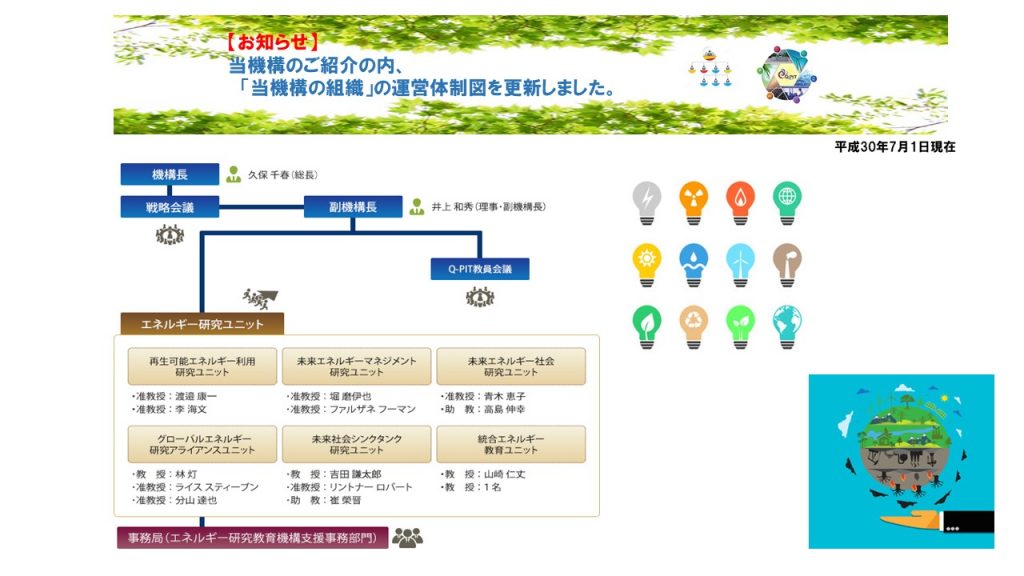
【Information】 Renewed organization chart
Information: Renewed organization chart as of July 1, 2018
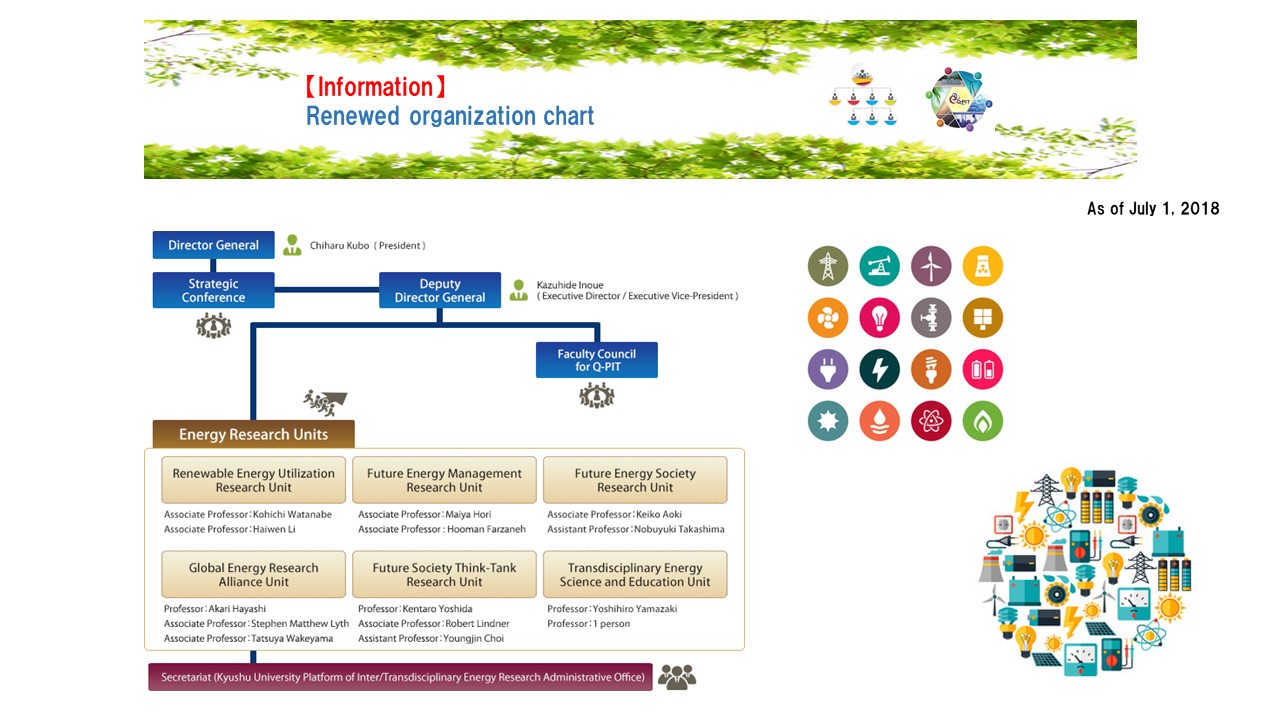
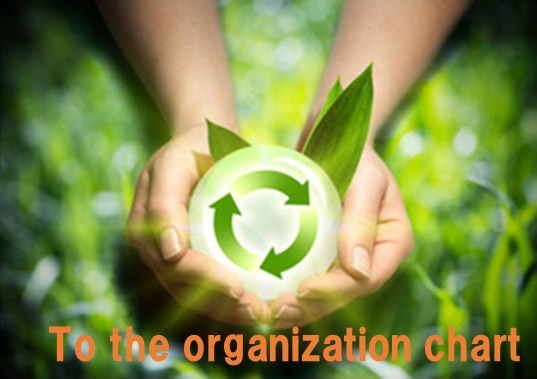
[Closed] 6th Q-PIT Seminar (SPM investigation of Two-dimensional Materials for Sustainable Energy Conversion )
On July 25th (Wed), 1st Advanced Energy Materials Seminar will be held.
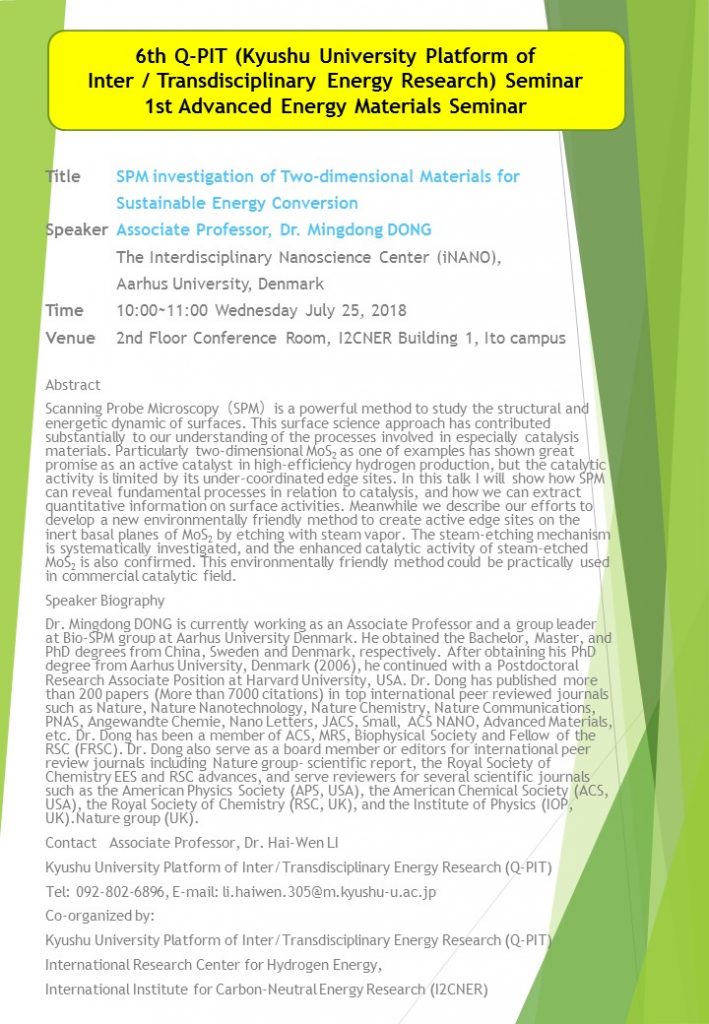
【開催終了】 第6回Q-PITセミナー開催 (SPM investigation of Two-dimensional Materials for Sustainable Energy Conversion)
下記のとおりセミナーを開催いたします。
皆様のご参加を心よりお待ちしております。
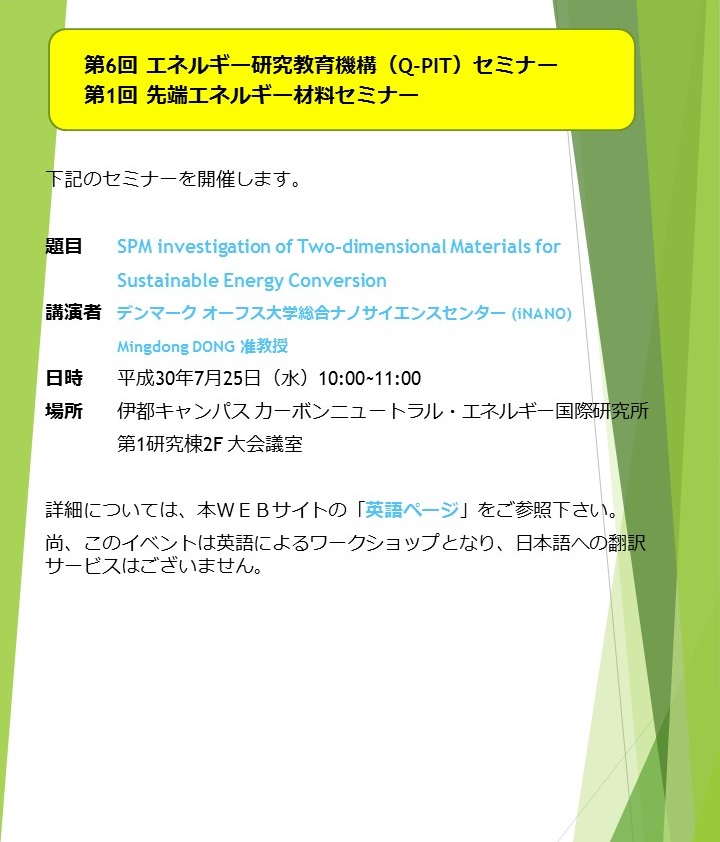
【学内限定公募】エネルギー研究教育機構 若手研究者・博士課程学生支援プログラムについて
平成30年度 エネルギー研究教育機構 若手研究者・博士課程学生支援プログラム
エネルギー研究教育機構(以下「本機構」という。)は、九州大学のアクションプランに基づき設置され、人文社会科学から自然科学までのあらゆる分野の優れた研究者により地球規模の課題となっているエネルギー問題を克服し、持続発展可能な未来型エネルギー社会を実現するため、学際融合、そしてエネルギー研究教育におけるワンストップ・ソリューションの具現を目指している。
本プログラムは、本機構が未来エネルギー研究の若手登竜門として、未来のエネルギー研究を担う若手研究者や博士課程学生の支援・育成・発掘を目的とするものである。

<各種目の詳細>
Ⅰ.若手研究者枠
【申請内容】
以下4分野に係る研究課題
分野①:再生可能エネルギー利用システムに関する研究
分野②:エネルギーマネジメントとエネルギー基盤技術が融合する近未来エネルギーマネジメントに関する研究
分野③:バイオエネルギーやエネルギー経済学・社会学等を含めた未来エネルギー社会に関する研究
分野④:その他エネルギー問題に関わると考えられるあらゆる分野
※本プログラムは「エネルギー」に係る、人文社会科学系から自然科学系までの全ての分野の研究課題を対象としています。本文最後に記載している<参考資料>、「申請分野(①~④)に関連する学術分野・専門分野キーワード」を参考にするなど、視野を広げ申請を検討してください。
※上記の分野と本機構の研究分野ユニットとの関連についてはこちらを参照
【申請資格・要件】
- 平成30年4月1日現在で35歳未満の若手研究者(教員及び学術研究員)
- 過去に本プログラムの研究代表者として採択されたことがある場合、2回目までは本枠(若手研究者枠)への研究代表者としての申請ができるものとする。
※1回目の応募者と、過去に研究代表者として採択されたことがある応募者の審査結果が同順位であった場合には、1回目の応募者を優先的に採択するものとする。
【採択件数】
9件程度
【申請額上限】
100万円まで
【支援経費】
50~100万円/件
(1) 対象となる経費
申請できる研究経費は、「設備備品費」、「消耗品費」、「旅費」、「謝金等」及び「その他」の研究計画の遂行に必要な経費とする。
※「設備備品費」が経費全体の50%を超える研究計画の場合には、当該経費の研究遂行上の必要性について、研究計画書に記載すること。
単に設備備品等の購入のみを目的とする研究計画は、申請できないものとする。
(2) 対象とならない経費
研究遂行に必要な経費であっても、次の経費は申請できないものとする。
①建物等施設に関する経費
②机、椅子、複写機等各部局で通常備えるべき設備備品を購入するための経費
③事務補佐員等を雇用するための人件費
【支援期間】
平成30年度末まで
Ⅱ.博士課程学生枠
【提案内容】
以下4分野に係る研究課題
分野①:再生可能エネルギー利用システムに関する研究
分野②:エネルギーマネジメントとエネルギー基盤技術が融合する近未来エネルギーマネジメントに関する研究
分野③:バイオエネルギーやエネルギー経済学・社会学等を含めた未来エネルギー社会に関す る研究
分野④:その他エネルギー問題に関わると考えられるあらゆる分野
※本プログラムは「エネルギー」に係る、人文社会科学系から自然科学系までの全ての分野の研究課題を対象としています。本文最後に記載している<参考資料>、「申請分野(①~④)に関連する学術分野・専門分野キーワード」を参考にするなど、視野を広げ申請を検討してください。
※上記の分野と本機構の研究分野ユニットとの関連についてはこちらを参照
特に、本機構がビジョンとして掲げている、2100年頃の未来社会のエネルギーシステム構想など、現時点では実現可否は問わないが、持続発展可能な未来型エネルギー社会の実現に向けて独創的かつ挑戦的な提案になることを期待している。
【提案資格】
- 博士後期課程在学者及び博士後期課程への進学を検討する博士前期課程在学者
- 過去に、本枠(博士課程学生枠)にて採択されたことがある場合、2回目までは本枠(博士課程学生枠)へ申請ができるものとする。
※1回目の応募者と、過去に採択されたことがある応募者の審査結果が同順位であった場合には、1回目の応募者を優先的に採択するものとする。
【表彰件数】
金賞:1件程度、銀賞:2件程度、銅賞:5件程度
【研究教育奨励経費】
表彰された課題について、表彰ランクにより当該学生の所属研究室へ研究教育奨励経費を支援する(当該学生の学会参加旅費等)。
(金賞:50万円、銀賞:40万円、銅賞:30万円)
※ただし、日本学術振興会特別研究員については、日本学術振興会以外からの資金援助に制限があるので、その範囲内の支援とする。
【支援期間】
平成30年度末まで
<採択件数・配分日付等>
(1)採択・表彰件数等については、予算の都合等により調整する場合がある。
(2)採択計画及び表彰課題に対する支援経費は、原則として平成30年4月1日付け配分とする。
<申請期限>
平成30年8月9日(木)(必着)
※申請書類は所属部局事務部を通して提出すること
<募集要項及び研究計画書様式>
| ▼募集要領 | 「平成30年度 若手研究者・博士課程学生支援プログラム 募集要領」(PDF) |
| ▼審査要領 | 「若手研究者・博士課程学生支援プログラム 審査要領(要約版)」(PDF) |
| ▼申請様式 | 「平成30年度 若手研究者支援プログラム研究計画書(若手研究者枠)」(EXCEL) 「平成30年度 若手研究者支援プログラム研究提案書(博士課程学生枠)」(EXCEL) |
| ▼変更理由書 | 「若手研究者・博士課程学生支援プログラム 変更等理由書(WORD) |
| ▼費目内訳変更承認申請書 | 「若手研究者・博士課程学生支援プログラム 若手研究者枠 研究経費費目内訳変更承認申請書(WORD) |

<採択された場合の条件等>
(1) 広報
学内外において研究経過及び研究成果を発表する場合は、本プログラムの支援を受けている旨を明記するなどして積極的に広報活動を行うこと。
また、本機構で開催するセミナー・シンポジウム等において、研究成果公開の取組(展示など)に積極的に参加すること。
なお、採択された者は、本機構が主催する各種イベントなど(九大エネルギーウィークなど)において、ポスター発表等を行うこと。
(2) 競争的資金制度への申請等
若手研究者枠で採択された者は、採択された年度又は次年度を目途に、科研費等の競争的資金制度へ必ず申請すること。
(既に科研費等を獲得し、新たに応募すると重複制限にかかる者及び雇用経費により他の競争的資金等に応募できない者は除く。)
また、博士課程学生枠で採択された者は、次年度以降の日本学術振興会特別研究員へ応募すること。(既に特別研究員として採用されている者を除く。)
(3) 研究計画の変更
次の場合には、所定の「変更等理由書」をエネルギー研究教育機構支援事務部門あて提出すること。
①他機関への異動や退職等により研究代表者が申請資格を失った場合や、研究計画の遂行が困難となった場合
②上記の他、研究計画書の記載内容に大幅な変更がある場合
(4)経費の流用について(若手研究者枠)
配分額全体の50%を超える額を、他の経費区分に流用する場合には、あらかじめ所定の「研究経費費目内訳変更承認申請書」をエネルギー研究教育機構支援事務部門あて提出すること。
☆本プログラムは、あらゆる分野からの応募を歓迎いたします。
<参考資料>
申請分野(①~④)に関連する学術分野・専門分野キーワード
分野①:再生可能エネルギー利用システムに関する研究
- 関連する学術分野例:総合理工、工学
- 専門分野キーワード例:再生可能エネルギー利用システム、水電解水素製造、燃料電池、水素貯蔵、ハイブリッド再生可能エネルギーシステム
分野②:エネルギーマネジメントとエネルギー基盤技術が融合する近未来エネルギーマネジメントに関する研究
- 関連する学術分野例:情報工学、システム工学、制御工学、経営工学、応用数学、プロセスシステム工学、ライフサイクル工学、エネルギーシステム工学、化学システム工学、機械工学、電気工学
- 専門分野キーワード例:データ解析、モデリング、ゲーム理論、システムインテグレーション、エネルギー貯蔵システム、地域エネルギーシステム、低炭素社会、技術経済評価
分野③:バイオエネルギーやエネルギー経済学・社会学等を含めた未来エネルギー社会に関する研究
- 関連する学術分野例:農学、環境学、エネルギー経済学、資源経済学、環境経済学、社会学、エネルギー政策
- 専門分野キーワード例:スマートファーム、バイオ由来エネルギー生産、途上国におけるエネルギー、温暖化対策、創・蓄・省エネルギー技術、分散型エネルギー社会
分野④:その他エネルギー問題に関わると考えられるあらゆる分野
【Public Offering Restricted to Campus】Q-PIT AY2019 Support Program for Young Researchers and Doctoral Students
AY2019
Kyushu University Platform of Inter-/Transdisciplinary Energy Research
Support Program for Young Researchers and Doctoral Students
The Kyushu University Platform of Inter-/Transdisciplinary Energy Research (Q-PIT) was established in accordance with the Kyushu University Action Plan. This platform aims to resolve global energy issues in association with promising researchers from various fields, from humanities and social science to natural sciences. Through the resolution of these issues, Q-PIT also aims to create a one-stop solution for energy research and education, and transdisciplinary projects to realize a future energy society that enables sustainable development. As a gateway to success, this program is targeting identification and support of young researchers and doctoral students who will play major roles in future energy research in society.

Details of each quota
Ⅰ. Quota for Young Researchers
[Details of application]
Research projects regarding the following four areas
Area 1: Research regarding renewable energy use systems
Area 2: Research regarding future energy management, and integrating energy
management with energy-based technologies
Area 3: Research regarding a future energy society, including bio-energy, energy
economy, and sociology
Area 4: Various fields related to other energy issues
* This program is aimed at the research projects of all fields, from humanities and social
sciences to natural sciences, related to energy. We recommend that you keep an open
mind when deciding whether you will apply for this program, referring to the “List of
academic fields and keywords of specialized fields pertinent to the research areas (1-4),”
on the last pages of these application guidelines.
* For details on relations between the areas above and the research areas of the units in
our platform, refer to the following:
https://q-pit.kyushu-u.ac.jp/en/about/vision.php
[Application eligibility and requirements]
Young researchers under 35 years of age as of April 1, 2018. (Faculty members and
post-doctoral fellows and research fellows)
If a researcher has been adopted under this quota (quota for young researchers) before,
he/she can apply for this support up to twice.
* If the applicant who has been adopted as the principal investigator in the past has the same ranking as the first applicant, the first applicant will be given priority.
[Number of projects for adoption]
Approximately nine research projects
[Maximum amount of request]
Up to 1 million yen
[Expenses that can be supported]
0.5 – 1 million yen per research project
(1) Expenses to be covered
Research expenses that can be applied include facilities/equipment, supplies, travel
expenses, honorariums and other expenses required to carry out research.
* If facilities and equipment expenses for the research plan exceed 50 percent of the
total expenses, the applicant must account for the necessity of such expenses in implementation of the research by specifying it in the research plan. A research plan
aiming to simply purchase facilities and equipment, etc. will not qualify for application.
(2) Expenses not covered
The following expenses will not be covered, even though the expenses may be required
for research.
a. Expenses related to buildings and other facilities.
b. Purchases of facilities/equipment such as desks, chairs, and copying machines that
would be normally purchased by each department.
c. Personnel expenses used to employ staff such as administrative assistants
[Other requirements regarding the application]
When applying for the program, the faculty member (special project) or the
post-doctoral fellow or research fellow are required to obtain the approval of the project leader.
A researcher cannot apply as the principal investigator for several categories at the
same time during the same academic year. However, he/she can participate in a research project as a co-researcher.
[Support period]
Until the end of AY 2018
Ⅱ. Quota for Doctoral Students
[Details of proposals]
Research projects regarding the following four areas
Area 1: Research regarding renewable energy use systems
Area 2: Research regarding future energy management, and integrating energy
management with energy-based technologies
Area-3: Research regarding a future energy society, including bio-energy, energy
economy, and sociology
Area 4: Various fields related to other energy issues
* This program is aimed at the research projects of all fields, from humanities and social
sciences to natural sciences, related to energy.
We recommend that you keep an open mind when deciding whether you will apply for this program, referring to the “List of academic fields and keywords of specialized fields pertinent to the research areas (1-4),” on the last pages of these application guidelines.
* For details on relations between the areas above and the research areas of the units in our platform, refer to the following:
https://q-pit.kyushu-u.ac.jp/en/about/vision.php
Regardless of whether it can be realized or not, this research is aimed at developing the concept of a future society energy system configuration to come into existence around the year 2100, one of our platform’s visions. The proposals are expected to be original and ambitious, with an aim to realize a futuristic energy society that enables sustainable development.
[Qualifications for application]
Doctoral students and master’s course students who are expected to proceed to doctoral
programs.
If a doctoral student has been adopted under this quota (quota for doctoral students)
before, he/she can apply for this support up to twice.
* If the applicant who has been adopted as the principal investigator in the past has the same ranking as the first applicant, the first applicant will be given priority.
[Number of awards (approximate)]
Gold awards: 1, Silver awards: 2, Bronze awards: 5
[Expenses for further research and education]
According to the rank of each award, expenses for further research and education are offered to the laboratories to which the students who receive the award belong. (These may include expenses such as travel expenses for corresponding students to participate in a conference of academic society to which they belong.)
(Gold awards: 500,000 yen, Silver awards: 400,000 yen, Bronze awards: 300,000 yen)
* Please note that there is a limit to external support funds for research fellowships for young scientists at the Japan Society for the Promotion of Science. Any amount of support in this area will be within that limit.
[Support period]
Until the end of AY 2018
Application deadline
The application must be submitted by August 9 (Thu), 2018
The application documents must be submitted through the administrative office of the department.
Application guidelines and forms
| ▶ Application Guidelines | AY2018 Support Program for Young Researchers and Doctoral Students Application Guidelines (PDF) |
| ▶ Screening Guidelines | Support Program for Young Researchers and Doctoral Students Screening Guidelines (simplified version) (PDF) |
| ▶ Forms | AY2018 Support Program for Young Researchers and Doctoral Students Research Plan (Quota for Young Researchers) (EXCEL)
AY2018 Support Program for Young Researchers and Doctoral Students Research Proposal (Quota for Doctoral Students) (EXCEL) |
| ▶ Form1-1 | Support Program for Young Researchers and Doctoral Students Statement of Reasons for Change (WORD) |
| ▶ Form1-2 | Support Program for Young Researchers and Doctoral Students (Quota for Young Researchers)Application for Approval for Change of Breakdown of Research Expenses (WORD) |

Requirements after adoption
(1) Public relations
During the announcement/publication of interim results and for the final outcome of research inside and outside the University, recipient researchers must be active in providing publicity for this program, for instance by openly specifying that the research has received support under this program.
Moreover, recipient researchers and students must actively cooperate with University efforts (such as participating in exhibitions held alongside seminars and symposiums of our platform) to make the research findings publicly available.
When the project is adopted, the recipients must give poster presentations in various events hosted by our platform, such as Energy Week. (Expenses for creating posters can be paid using the support of this program)
(2) Application for competitive funding programs, etc.
The researcher whose program is adopted for the quota of young researchers must apply for Grants-in Aid for Scientific Research (Kakenhi) or other competitive funding programs in the academic year of adoption or in the following academic year.
(This rule does not apply to those researchers who have already acquired funding, such as a Grant-in-Aid for Scientific Research and will be limited by restrictions on duplicate funds if they newly apply for the program. The rule also does not apply to researchers who have been employed via funding resources and are not allowed to apply for other competitive funding programs.)
The student whose program is adopted for the quota of doctoral students must apply for the research fellowship for young scientists of the Japan Society for the Promotion of Science. (This rule does not apply to students who have already been adopted for a research fellowship for young scientists.)
(3) Changes in the research plan
Complete the “Statement of reasons for change” and submit it to the Kyushu University Platform of Inter-/Transdisciplinary Energy Research Administrative Office, if any of the following apply.
Ⅰ. If the principal investigator must abandon his/her application for the program due to transfer to another institute, resignation, or other reason, or when the implementation of the research plan has proven too difficult.
Ⅱ. Other than above, when the description in the research plan documentation has been broadly modified.
(4) Reallocation of expenses (quota for young researchers)
When reallocating over 50% of the total allocated expenses from one category to another, submit the “Application for Approval for Change of Breakdown of Research Expenses” to the Kyushu University Platform of Inter-/Transdisciplinary Energy Research Administrative Office in advance.
◇In this program, we welcome applications from various fields.
References
List of academic fields and keywords of specialized fields pertinent to research areas (1-4)
Area 1: Research regarding renewable energy use systems
– Pertinent academic fields: interdisciplinary science and engineering, engineering
– Keywords of specialized fields: advanced research on renewables, water electrolysis hydrogen production, fuel cells, hydrogen storage, hybrid renewable energy system
Area 2: Research regarding future energy management, and integrating energy management with energy-based technologies
– Pertinent academic fields: information technology, systems engineering, control engineering, management engineering, applied mathematics, process system engineering, life cycle engineering, energy system engineering, chemical system engineering, mechanical engineering, electrical engineering
– Keywords of specialized fields: data analysis, modeling, game theory, system integration, energy storage systems, local energy systems, low-carbon society, techno-economic assessment
Area 3: Research regarding a future energy society, including bio-energy, energy economy, and sociology
– Pertinent academic fields: agricultural sciences, environmental science, energy economics, resource economics, environmental economics, sociology, energy policy
– Keywords of specialized fields: smart firm, generation of bio-derived energy, energy issues in developing countries, measures against global warming, energy-saving, energy creation, and energy storage technologies, distributed energy society
Area 4: Various fields related to other energy issues
【お知らせ】エネルギー研究教育機構支援事務部門へのアクセス
エネルギー研究教育機構支援事務部門の所在は、下記の場所です。
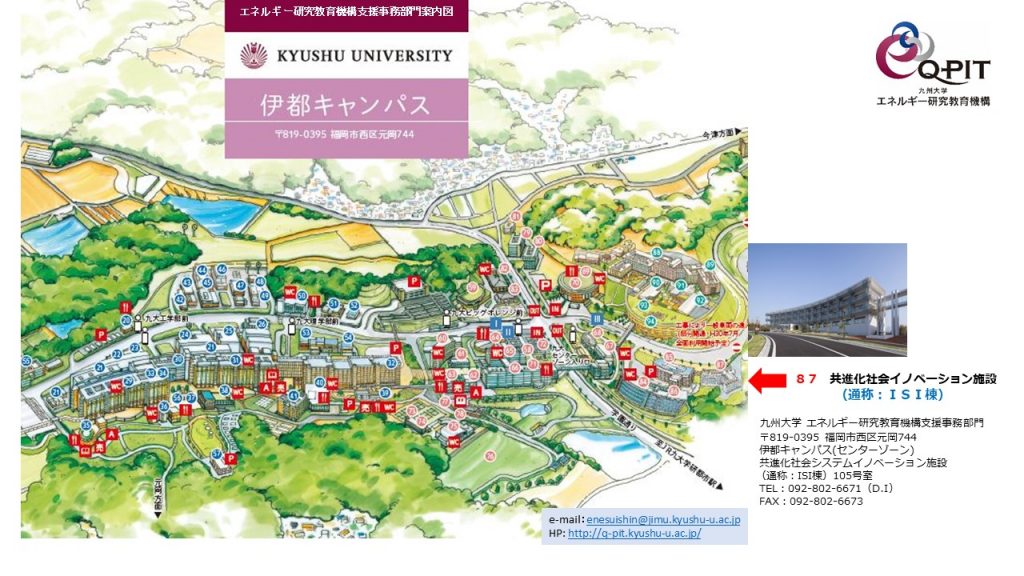
Notification:The promotion office for Energy Research changed its name to Administrative Office for Energy Research
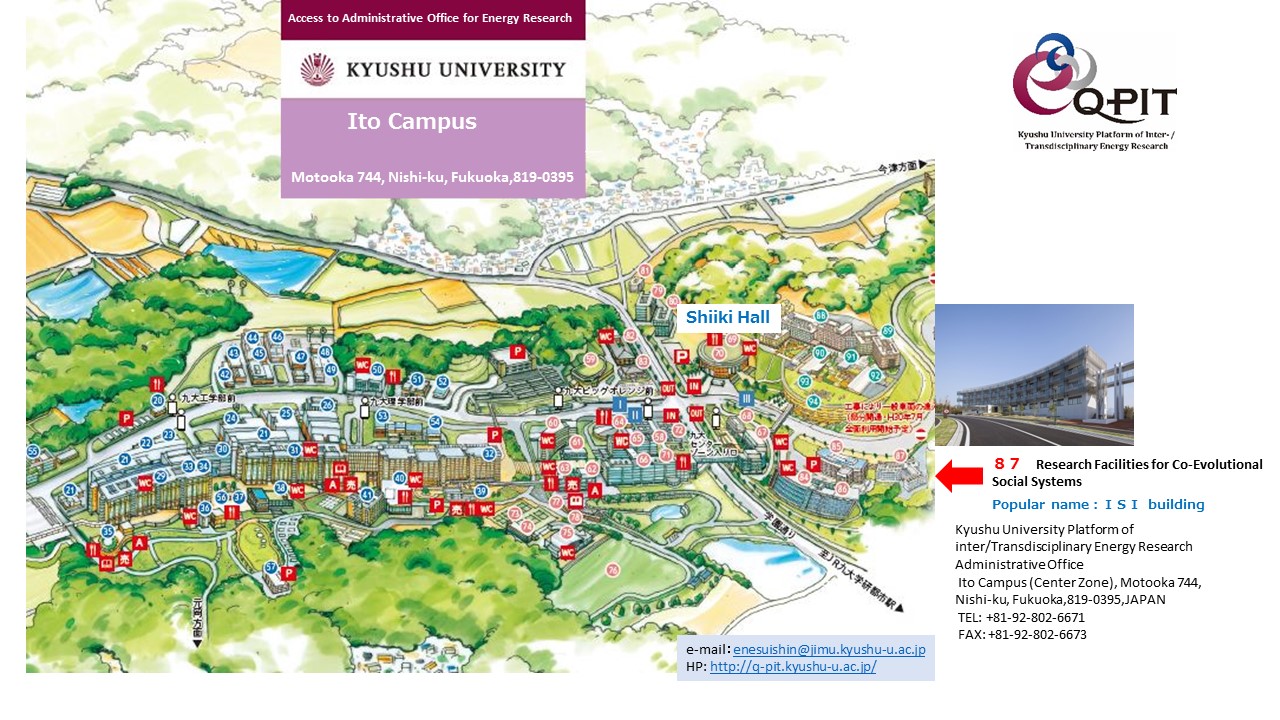
【ご挨拶】新体制ー「Q-PIT教員会議」の設置 副機構長・議長・副議長からメッセージを頂きました
Q-PIT教員会議の運営を開始しました。
